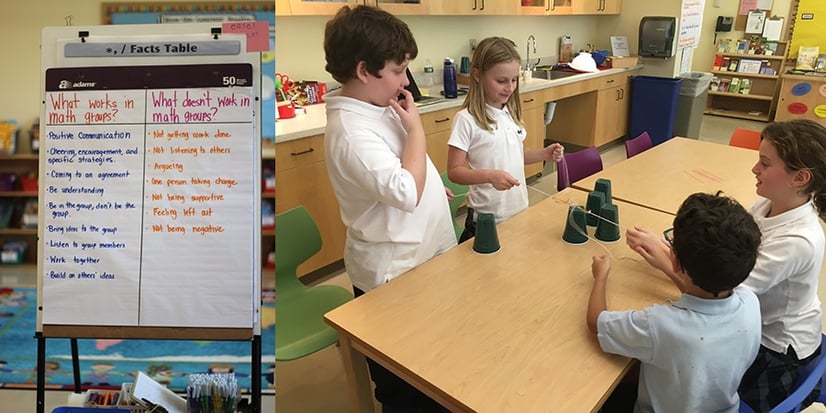When you hear the word mathematician, what comes to mind?
Most students will answer by saying something along the lines of "Someone who works with numbers." And while that can be true, number sense is only one strand of mathematics. The discipline of mathematics encompasses shape and space, pattern and function, data, and measurement in addition to number sense and operations.
At Whitby we're shifting the perspective that mathematicians only work with numbers and that the right answer is the only indicator of success. The Lower School teams are beginning the year with a unit titled "What is a Mathematician?" where they will work with the students to come to a common understanding of what math means in our community. Using the Common Core Mathematical Practices as a guide they will explore the idea that math is a language of communication and a way to find out about our world.

The Common Core outlines eight mathematical practices that are essential to understanding the subject.
- Make sense of problems and persevere in solving them
- Reason abstractly and quantitatively
- Construct viable arguments and critique reasoning of others
- Model with mathematics
- Use appropriate tools strategically
- Attend to precision
- Look for and make use of structure
- Look for and express regularity in repeated reasoning
You will notice that the word "number" does not appear in any of the practices. In fact, one could argue that the majority of these are practices are essential to succeeding in life, not just mathematics. Logical reasoning is at the heart of mathematics. It is for this reason that we often value the process over the product. While the correct answer is always good, if a child cannot explain how they arrived at it, then there is not true understanding. Conversely if a student can explain their reasoning and walk you through their steps, yet arrive at the incorrect answer, there's value in that, too.
In an inquiry-based classroom a few bumps in the road or detours along the way are not only anticipated, but celebrated.
In our classrooms, students are encouraged to solve problems in two, three, or even four different ways to support their thinking skills and make them visible. Many times students will be asked to teach each other their methods and then discuss the pros and cons in order to find the best method for the given situation. In an inquiry-based classroom a few bumps in the road or detours along the way are not only anticipated, but celebrated. This provides teachers a great opportunity for differentiating instruction and a good opportunity for students to find value in others' perspectives.
Here at Whitby we believe that everyone is a mathematician. It is our job to foster an environment of risk-taking and open-mindedness to help tap into everyone's potential. Making use of the mathematical practices is the first step in creating a growth mindset for our students.

